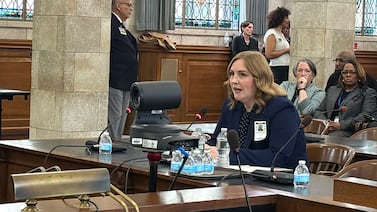Sign up for Chalkbeat Detroit’s free newsletter to keep up with the city’s public school system and Michigan education policy.
As the Trump administration pulls back support for English language learners, Michigan is rolling out new requirements for schools to educate such students.
Starting this school year, Michigan districts will be required to meet minimums of specialized instructional time for English learners. Districts will risk losing state funding allocated for those students if they do not comply.
State Superintendent Michael Rice also reminded local school leaders in a recent memo that the Trump administration’s revocation last month of guidance that spelled out the rights of more than 5 million English learners in the U.S. does not “alter the rights of students under Michigan law.”
Even without the guidance, federal legal protections for English learners remain.
In Michigan, there are more than 104,000 English learners, which make up about 7.3% of the total student population.
“Although federal protections may seem fragile, Michigan’s commitment to fairness and access in education remains steadfast,” he said in the memo to school leaders. “The legal protections afforded by our state have not changed, and Michigan continues to uphold the principles of inclusion and non-discrimination for all students.”
Still, some advocates fear the rescission of the guidance will cause confusion for local schools and weaken federal oversight of students’ rights. Educators say the guidance was a key part of determining what schools are required to do for students – without it, they fear English learners across the state will see a reduction in services or go without.
Jennifer Mrozowski, senior director of strategic communications and external relations at the research and advocacy group Education Trust-Midwest, said the rollback of the guidance “is a step backwards.”
“It builds upon the Trump administration’s ongoing and immoral attacks on not only public education but on our most vulnerable students,” she said.
An Education Department spokesperson told Chalkbeat it rescinded the 2015 Dear Colleague letter “because it is not aligned with Administration priorities.”
The rollback of the guidance comes as the Education Department considers winding down an online toolkit for helping English learners and the Trump administration proposed phasing out Title III funding for English language education, among other measures.
Earlier this year, the federal government ended the decades-old practice of treating schools and child care centers as “protected” locations where immigration arrests would not occur. The policy change left many families in Michigan in fear of dropping off and picking up their kids from school.
Immigration crackdowns have affected Michigan students in recent months, including the deportation of a Western International High School student in Detroit.
Samantha Magdaleno, executive director of youth-led immigrant rights organization One Michigan, said President Donald Trump’s actions send the message that immigrant students are not welcome in schools.
“We should be focused on helping children and giving them an education,” she said. “This is a basic human right.”
Michigan schools have four years to meet staffing needs for educating English learners
In addition to Michigan’s existing laws protecting language access for students, this year will be the first that local districts will have to follow specific requirements for educating English learners.
Last year, the Democrat-controlled Michigan legislature amended the state school aide act to require schools to provide English learners with a mandatory number of minutes in language instruction.
Federal law and precedent do not require schools to provide any particular kind or amount of service, nor did the rescinded guidance.
The Michigan Department of Education, or MDE, and Michigan’s English Learner Advisory Committee created the framework for the new requirements. Their recommendations were based on a review of settlements and agreements from 24 federal civil rights complaints over the last 20 years in multiple states. One of the cases was a 2014 complaint against the Crestwood School District in Dearborn Heights.
Settlements made between all of the school districts and the federal Education Department included plans to implement appropriate hours of language instruction from teachers with additional training in multilingual education.
Michigan’s new requirements for students with lower proficiency in English include at least 150 minutes of language acquisition instruction, provided separately from other classes with a teacher with multilingual or bilingual education credentials. Another 150 minutes can be integrated into general education classrooms, and it may include working with a second teacher endorsed in English as a second language education.
Students with higher proficiency levels are only required to receive 150 minutes a week in either type of classroom setting.
Those who are phased out of English language programs after reaching proficiency must be monitored for four years after fully integrating into general education classrooms.
Students’ English language proficiency is based on results from annual assessments given to newcomers to the U.S., students who change districts, and those who are identified by educators as potential English learners.
The new required minimums likely mean some districts will have to hire or train more multilingual teachers. School systems without enough teachers to meet the requirements must have a plan to hire more staff in four years or less, according to the MDE.
Districts will be required to submit reports on how they use state funding for English learners to the MDE each year. If districts do not comply, the MDE may withhold the state funding.
Marcie Lipsitt, a Michigan education advocate who helps families with civil rights complaints, said she is skeptical that the state will be able to enforce the new requirements.
English learners have long been underserved in the state, said Lipsitt. Language barriers and immigration fears often prevent families from filing formal civil rights complaints when students don’t receive the education to which they are entitled, she added.
“As an advocate, you can’t file a complaint on behalf of someone else in Michigan like you can at the federal level,” said Lipsitt. “That’s a huge roadblock because I can’t even help protect a family by filing for them.”
Magdaleno said some of the youth she works with struggle to learn English in Michigan schools, despite existing protections.
English learners can still file federal or state complaints
English learners’ rights are not found in any one law. Instead, they come from a culmination of federal laws and court cases.
The 40-page Obama-era Dear Colleague letter listed those protections in one document.
It provided educators with examples of how schools should serve students in order to comply with the legal precedent, case law, and federal requirements it cited.
Among the framework the document laid out were common areas of noncompliance in schools, such as failing to identify and assess potential English learners, inadequate staffing, and unnecessary segregation of students. The letter also provided fixes to ensure programs’ effectiveness.
For example, the document offered a solution that many school districts found to streamline evaluating potential English learners. The guidance suggested asking parents to complete a home language survey to help assess students’ needs before school starts and testing those identified as possibly needing services within the first week of class to minimize disruptions.
English learners may still file complaints about their education because the legal protections cited in the letter remain in place.
The Department of Education’s Office for Civil Rights handles such cases, but many parents and advocates report their complaints have been stagnant since the Trump administration laid off the staff of seven of its 12 civil rights enforcement offices in March. One of those closed was the Cleveland office, which handled cases for Michigan and Ohio.
Also in March, the Trump administration laid off nearly every staff member tasked with ensuring states and schools properly spent hundreds of millions of federal dollars earmarked to help educate the more than 5 million English learners in the U.S.
English learners may also file complaints of discrimination based on race or country of origin with the Michigan Department of Civil Rights, which enforces the state’s civil rights laws.
Michigan’s 1977 Elliott-Larsen Civil Rights Act prohibits discrimination based on race and national origin in educational institutions. Michigan’s 2023 Meaningful Language Access to State Services Act also requires state agencies make services accessible to non-English speakers.
“Ensuring meaningful access is not only a legal issue,” Rice said in his memo to school district leaders. “It is a reflection of our shared values and our collective responsibility to the students, parents, and communities that we serve.”
Bob Wheaton, the Michigan Department of Education’s director of public and governmental affairs, told Chalkbeat the agency will review the need for any additional guidance in light of the federal changes and will “continue to provide guidance, monitoring, and technical assistance to districts to ensure clarity around compliance.”
Lipsitt said parents and community members should also take complaints to local school leaders.
“Go to your elected school boards,” she said. “Hold them accountable.”
Hannah Dellinger covers Detroit schools for Chalkbeat Detroit. You can reach her at hdellinger@chalkbeat.org.




